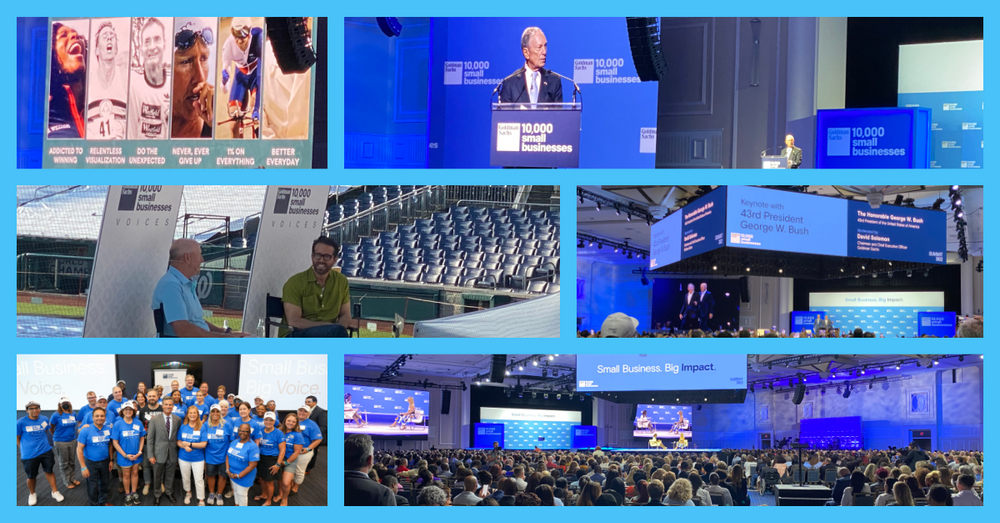OPINION: We Need To Demand Lawmakers Step Up for Our Nation’s Entrepreneurs
 Ben Johnson, CEO Freya Systems advocates for small businesses at Goldman Sachs 10,000 Small Business Voices Washington Summit.
Ben Johnson, CEO Freya Systems advocates for small businesses at Goldman Sachs 10,000 Small Business Voices Washington Summit.What Do a Former President, A-List Actors, and 2,600 Small Business Owners Have In Common? We Descended on Washington To Demand Lawmakers Step Up for Our Nation’s Entrepreneurs
By Ben Johnson
Did you know that 99% of the more than 6 million employer firms in the U.S. are small businesses like mine, almost all with fewer than 100 employees?
Statistics consistently show that small businesses are the engine of our nation’s economic growth -- so why do we struggle to get our voices heard on Capitol Hill and in statehouses across the country?
This question is especially relevant now, when small business owners are striving to emerge intact from the pandemic while facing the twin challenges of inflation and supply chain issues, and workforce shortages that are proving more severe and stubborn than most of us have ever experienced. (A recent Goldman Sachs survey found that 97% of small business owners say hiring challenges are adversely impacting their bottom line.)
That’s why I recently traveled to Washington, D.C. along with more than 2,500 other small business owners from across the U.S. to be part of Goldman Sachs 10,000 Small Business Voices Summit. We came to make our voices heard, and to hear from a powerful lineup of politicians, entrepreneurs, celebrities, and academics – including former President George W. Bush, actors and entrepreneurs Gwyneth Paltrow and Ryan Reynolds, and The Oracle of Omaha himself, Warren Buffet.
We drew inspiration from them and each other, sharing ideas and, importantly, speaking as one in demanding change – from access to affordable childcare to overhauling the small business lending process. These improvements and others will drive our economy forward by helping small businesses compete at today’s speed of commerce.
During more than 300 meetings with our U.S. senators and representatives, we advocated for our Number One call for action: modernizing the Small Business Administration (SBA), which was last reauthorized 20 years ago. Back then, Blu-ray was winning the DVD wars and smartphones were still a thing of the future. Can you imagine how doing business has changed since then? That’s why reimagining SBA's programs and streamlining its bureaucracy with 21st-century technology and solutions is essential to ensuring that small business owners can compete in our modern economy.
We also called on our elected officials to help us attract and retain employees. What does that look like? It means helping our employees access affordable child and family care; renewing programs such as the Employee Retention Credit, which gives employers tax credits for wages paid to workers; enhancing the Paid Family and Medical Leave tax credit; and decoupling the Dependent Care Assistance Plans from the Child and Dependent Care Tax Credit.
We are also working with our elected officials to level the playing field for small businesses for a piece of the billions of dollars in federal contracts awarded every year. For context, our government spent more than $645 billion on contracted services last year alone. But unfortunately, over the past two-plus decades the number of small businesses participating in our national economy as federal contractors has plunged by 38%. And the number of small businesses new to the federal government procurement market declined by 79% between 2005 and 2019.
As founder and CEO of a data analytics and custom software company in Greater Philadelphia, I speak from experience when I say that navigating government contracting can be challenging, exacerbated by an old-school bureaucratic RFP process that creates cost and time barriers impossible for most small and emerging businesses to absorb. As a result, the barriers to entry for small businesses to win contracts with the federal government are very high.
Small business owners like me are not asking our government for a handout; we want a fair shot at winning our government's business. We need our legislators to improve the Electronic Subcontracting Reporting System and Contractor Performance Assessment System, which play a key role in providing data and giving small business contractors a voice, and to raise the simplified acquisition threshold to broaden the scope of opportunities for many small businesses.
While in Washington as an advocate, I spoke to small business owners from Philadelphia to Phoenix, and we agree that the most important step our elected officials can take right now is to reauthorize and modernize the SBA. This is an essential first step toward creating a fairer and more equitable environment for business growth, economic expansion, and employee fulfillment.
If you agree, I encourage you to share your voice with your representatives; help make sure the SBA gets modernized and reauthorized. For more information and contacts, click https://www.congress.gov/members/find-your-member
Ben Johnson is co-founder and CEO of Freya Systems LLC, a data analytics and custom software company based in Media, Pennsylvania. He’s also a member of Goldman Sachs 10,000 Small Business Voices initiative.
About Freya Systems
Freya Systems enhances its customer’s decision power by turning their data into wisdom. Continuous learning is central to Freya Systems’ culture and the driving force behind their webinar series on Predicting Component’s Future to Plan Better Now, Building Effective Dashboards, and Predictive Optimization for Fleet Readiness. For more information on Freya Systems, visit their website at www.freyasystems.com
Contacts
